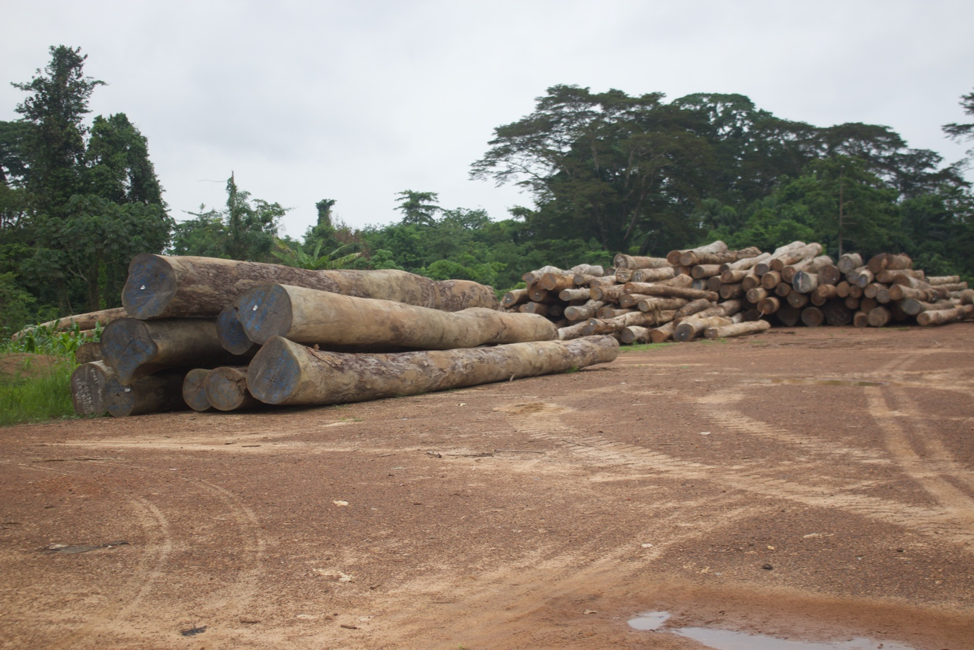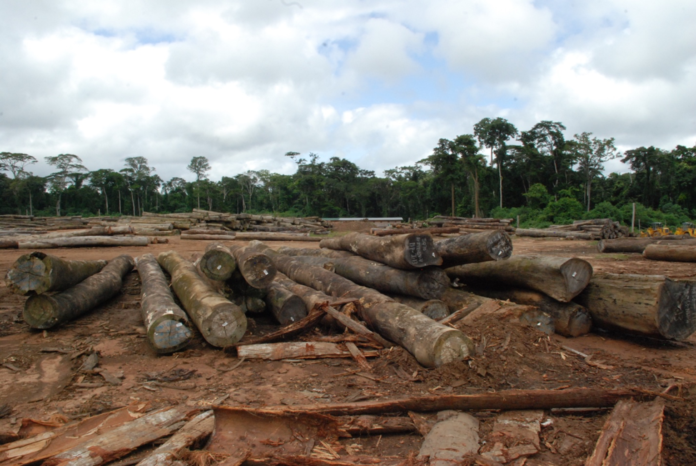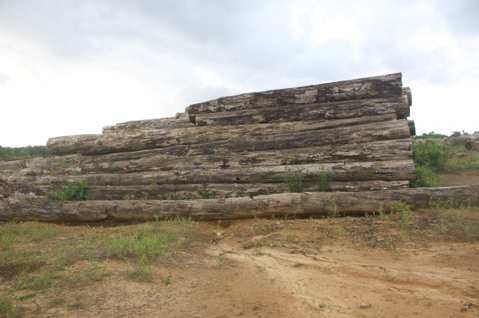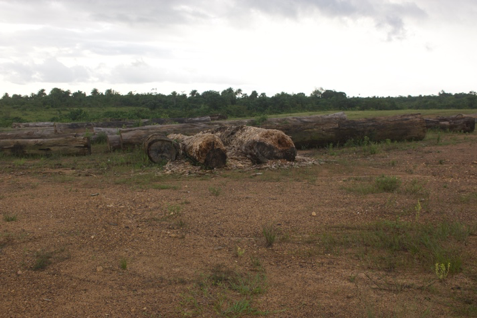Top: Some of the logs Sing Africa Plantation Liberia Limited abandoned at its sawmill in Zorzor, Lofa County. The DayLight/James Harding Giahyue
By James Harding Giahyue
Editor’s Note: In this second part of a series on Sing Africa Plantation Liberia Limited, we reveal how the Singaporean logging company abandoned a large number of logs in Lofa and Grand Bassa.
BALAGWALAZU, Lofa County – Sing Africa Plantation Liberia Limited, a Singaporean logging company, might have harvested about US$2.2 million worth of logs outside its concession in Bluyeama Community Forest mainly between 2018 and last year.
But it has abandoned about 2,500 logs it cut within that period, including logs the company illegally harvested, further investigation The DayLight conducted into the firm’s operations discovered. Around a fifth of the logs have already decayed.
Legally, logs are abandoned when they are left unattended between 15 and 180 days, depending on their location and the result of a three-month government-run inquiry. That means even logs Sing Africa felled in December last year, the latest of its production, are abandoned.
Our calculations of the company’s official production and export records between 2019 and last year show that it has 1,426 logs that have not been exported. Having only obtained production and shipment data in volume between 2017 and 2018, we estimated the difference of 10,761 cubic meters to be 1070 logs.
The logs are scattered at different locations. Most of them are in the company’s sawmill in Balagwalazu, with some in its log yards on the Gbarnga-Lofa highway and in Grand Bassa County.
We counted about 500 woods—several with Sing Africa markings—in a large open field in Buchanan, all of which have already decayed. Their remnants created sponge-like coatings everywhere as if the area were a graveyard for trees. You could take the cawing of birds that pierced the quietude of the deserted area for a eulogy.
“It’s not even good for charcoal now,” said one woman, who did not want to be named due to safety reasons.
The members of the leadership of Bluyeama Community Forest, who monitor the company and have records of all its operations, corroborated our findings. Gayflorson Korballah, one of Bluyeama’s leaders, pointed out huge piles of logs that had been harvested in 2017 and 2018. Alexander Songu, the head of the leadership, said most of the ones in the log yard had been harvested in 2019.
We traced some of the logs to the company’s official production records from their tracking numbers.
Tracking logs is a major component of postwar forestry reform in Liberia. Every tree felled must have an identification number that can be used to track logs from harvest to export.
The illegal logging and the failure of the company to pay the community its benefits have left locals frustrated. Since 2009, villagers have had the right to manage their forests alongside the government. Bluyeama, a 49,444 hectare woodland in the Zorzor District bordering Gbarpolu, was certified in 2011.
Following a difficult relationship with Ecowood, a previous logging company, it signed an agreement with Sing Africa in January 2016. But the company has not lived up to its promises. It owes both the Liberian government and the community US$121,271, according to the record of a meeting of players in the forestry industry on the implementation of Liberia’s Voluntary Partnership Agreement (VPA) with the European Union official records released in March earlier this year. That is one of the highest debts any company owes in the entire forestry sector.
Loss of Revenue
The Forestry Development Authority (FDA) has known about the abandoned-logs issue since, at least, two years ago, evidence shows. In August 2020, an inquest by the agency found that Sing Africa abandoned 675 pieces of ekki wood (Lophira alata), an expensive, first-class log, in Buchanan. It also found that Star Wood—run by the Guptas, the Singaporean family that owns Sing Africa—left 465 logs at that same location.

“Logging contract holders are not doing much to minimize [the] incident of abandoned logs,” the report, leaked to us, said at the time. It said companies were harvesting logs without first securing sales contracts.
“Much-needed revenues that the national government requires for national development have been lost due to the unprecedented abandonment of assorted round logs by logging companies,” it added.
But it was only two months ago that the FDA started to take action. In April, it gave all companies a one-month period to declare the logs they had not shipped. Managing Director Mike Doryen told The DayLight a countrywide auctioning of abandoned logs would have begun at the end of that month, which did not happen.
“[Bluyeama] is an area of concentration for ourselves,” Doryen said. “Those who did not remove their logs as per the stipulated time, the lawyer will now go to the court to seek judicial actions to have the logs confiscated the auctioned.”
Doryen’s timeline for an auction was impossible. It takes several months of court orders and required notices for abandoned logs to be auctioned, according to the Regulation on Abandoned Logs, Timber and Timber Products. There were no records of such order at the circuit courts in Voinjama and Buchanan.
It was until earlier this month that the FDA began to inquire countrywide about abandoned logs, following three reports by The DayLight on the subject. Harris Zeah, the ranger responsible for Lofa, Bong and Margibi, was suspended and replaced a week after our report of illegal logging in Bluyeama. “Management’s action is predicated upon your consistent failure to meet work plan objectives, including your failure to adequately and timely address noncompliance issues in… the Bluyeama Community Forest,” Zeah’s suspension letter read.
Mukesh Gupta, Sing Africa’s CEO and head of the Guptas, denied any wrongdoing, blaming the coronavirus pandemic.
“We were loading by containers but when the Covid-19 hit, there was no buyer,” Gupta told The DayLight in an interview at the company’s Rehab office in Paynesville. “Covid-19 has damaged us so much. I think I should be supported, given the kind of investments we have made in the community.”
Though the pandemic shattered supply chains worldwide, especially in the Asian markets Sing Africa exports its logs, the company continued to cut trees. Between 2019 and 2020, it harvested 2,000 logs, according to official records. And while it only exported 189 logs during that time, it added 166 logs the following year. It did not apply for force majeure, a legal recourse companies take to address things like disease outbreaks, conflicts and natural disasters.
“We never cut the trees thinking that they would be abandoned. We cut the trees thinking that Covid-19 would go away soon. We are surprised that Covid-19 has stayed on for long,” Gupta added.
Sing Africa faces millions of United States dollars in fines and could be one of the heaviest in the Liberian logging industry’s history. Abandonment of woods in log yards, sawmills and ports carries a fine of three times the international prices of each class of logs.
The regulation was created to prevent waste of forest resources and to make sure companies harvest logs sustainably. It replaced an earlier regulation that narrowed the definition of abandonment to logs found outside a concession, lacking tracking barcodes. Its establishment in 2017 came amid a crackdown on illegal logging by importing countries, including the European Union.
Waste of the logs from Bluyeama adds to the Zorzor region’s forest loss. From 2002 to last year, the district lost 20.6-kilo hectares of humid primary forest, according to Global Forest Watch, which tracks deforestation worldwide. That number is one of the highest among community forests, according to a study by the FDA and the World Resource Institute, a global research charity. Tree cover loss refers to the removal of forest canopy by people or nature.
Zahn Dehydugar of the Community of Forest and Environmental Journalists contributed to this report.
The fund for the story was provided by Fern. The DayLight maintained complete editorial independence over its content.



